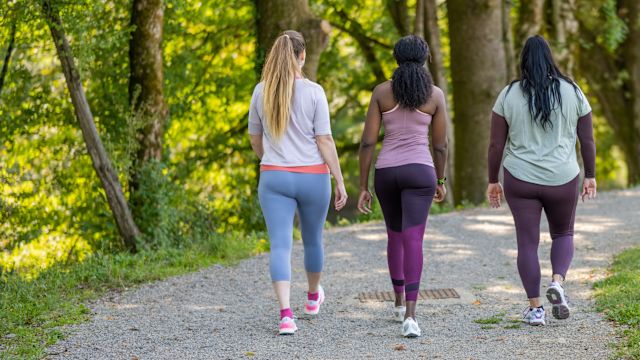Updated on March 5, 2024.
Eating a healthy diet is important for maintaining a healthy weight. But another key part of any weight-management plan: consistent physical activity.
Getting off the couch and starting an exercise routine may be easier said than done, though. If you're not quite ready to leap into a workout routine, try this simple first step: Go for a walk. You don't need a gym, special classes, or pricey equipment—just a few minutes and a decent pair of sneakers. Walking on a regular basis can improve your overall health in multiple ways.
Try these tips to maximize the benefits.
Lace up when you feel a craving coming on
If you're feeling a midday energy crash coming and your mind turns to sweet snacks, try getting up and heading out the door. Instead, amble around your neighborhood, a local track, or a nearby park. You may find that your craving disappears. Research has shown that a brisk stroll may temporarily reduce the want for sugary foods.
Pick up the pace every now and then
Walking at a regular stride is good for your body and mind. Unfortunately, walking at a leisurely pace doesn't burn many calories. If you want to increase your calorie burn, alternate your regular walking pace with more intense one- to three-minute intervals. ("Intense" means that your pace is fast enough that having a conversation is difficult but not so hard that you want to stop talking altogether.)
After picking up your pace for a few minutes, dial back to your regular stride for a minute or more to recover. Repeat this cycle as often as you can for as long as you want.
Walking intervals can also make your stroll more interesting. Have fun with it. For example, you can sync your intervals with milestones along the way.
Walk at twice your regular pace toward the first stop sign you see, then reduce our pace till the next one—then double time it again along the next block. However you do your intervals, varying your intensity and exertion will dramatically increase the calorie burn during your walks.
It's not only about speed
Walking is a simple yet versatile form of exercise. In addition to intervals, consider these other ways to bolster your walking routine—and burn even more calories in the process.
- Frequency: When your feel like you've hit a plateau in your program, add another session of walking to your week.
- Intensity: After you've added more walking sessions, try some hills to make your walk a little harder. When you're heading uphill, you should be able to carry on a conversation, but you should have to take a deep breath with every other sentence.
- Time: Walk a little longer each session. Add 10 minutes to your walk every day and you'll have amassed an extra 70 minutes each week.
Do you want to raise your activity levels and meet your exercise goals? Studies suggest that tracking your steps can help you be more active. Your phone may have a step tracker that can help you set—and exceed—your goals.







